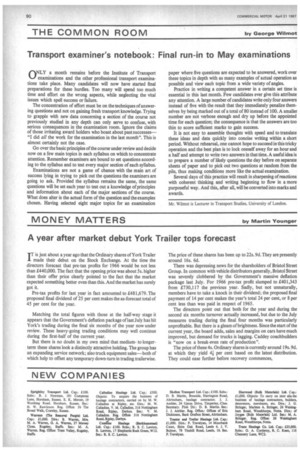Transport examiner's notebook: Final run-in to May examinations
Page 92

If you've noticed an error in this article please click here to report it so we can fix it.
ONLY a month remains before the Institute of Transport examinations and the other professional transport examinations take place. Many candidates will now have started final preparations for these hurdles. Too many will spend too much time and effort on the wrong aspects, while neglecting the vital issues which spell success or failure.
The concentration of effort must be on the techniques of answering questions and not on gaining fresh transport knowledge. Trying to grapple with new data concerning a section of the course not previously studied in any depth can only serve to confuse, with serious consequences in the examination room. Ignore the claims of those irritating award holders who boast about past successes— "I did all the work for the examination in the last month". This is almost certainly not the case.
Go over the basic principles of the course under review and decide now on a few main topics in each syllabus on which to concentrate attention. Remember examiners are bound to set questions according to the syllabus and to test every major section of each syllabus.
Examinations are not a game of chance with the main art of success lying in trying to pick out the questions the examiners are going to ask. Provided the syllabus remains the same, the same questions will be set each year to test out a knowledge of principles and information about each of the major sections of the course. What does alter is the actual form of the question and the examples chosen. Having selected eight major topics for an examination paper where five questions are expected to be answered, work over these topics in depth with as many examples of actual operation as possible and view each topic from a wide variety of angles.
Practice in writing a competent answer in a certain set time is essential in this last month. Few candidates ever give this attribute any attention. A large number of candidates write only four answers instead of five with the result that they immediately penalize themselves by being Marked out of a total of 80 instead of 100. A smaller number are not verbose enough and dry up before the appointed time for each question; the consequence is that the answers are too thin to score sufficient marks to gain success.
It is not easy to assemble thoughts with speed and to translate these ideas and data quickly into concise writing within a short period. Without rehearsal, one cannot hope to succeed in this tricky operation and the best plan is to lock oneself away for an hour and a half and attempt to write two answers in that time. A useful idea is to prepare a number of likely questions the day before on separate sheets of paper and to pick out two questions at random from the pile, thus making conditions more like the actual examination.
Several days of this practice will result in sharpening of reactions with coherent thinking and writing beginning to flow in a more purposeful way. And this, after all, will be converted into marks and awards.
Mr. Wilmot is Lecturer in Transport Studies, University of London.




































































































































